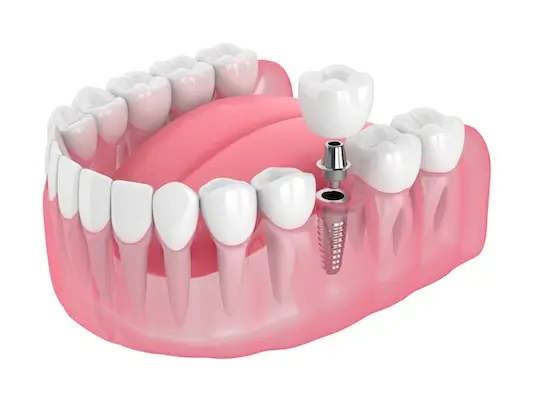Root Canal Treatment
Root Canal Treatment
 When it comes to fearsome dental treatments, root canal definitely has one of the worst reputations. While in the past it was considered to be one of the most painful of all dental treatments, fortunately, the tools and techniques used to perform root canal treatment have evolved significantly. Today, root canal treatment causes no more discomfort than any other type of fairly invasive dental procedure.
When it comes to fearsome dental treatments, root canal definitely has one of the worst reputations. While in the past it was considered to be one of the most painful of all dental treatments, fortunately, the tools and techniques used to perform root canal treatment have evolved significantly. Today, root canal treatment causes no more discomfort than any other type of fairly invasive dental procedure.
What is root canal treatment?
Root canal is the primary treatment used to resolve infections that occur in the root canal system, the deepest part of your tooth. Left untreated, these infections can cause the patient to experience serious pain, inflammation and eventually, tooth loss. If infection of the root canal system occurs, this procedure is the only viable way of saving your tooth.
Every tooth has at least one root, and molars can have several. These roots extend all the way from the crown to deep within the jaw bone. If an infection penetrates the root, it can compromise the flow of blood and nutrients between the body and the tooth, causing the tooth to die.
Unfortunately, antibiotics have been shown to be ineffective in treating root canal infections. Instead, patients must undergo root canal treatment.
What is involved in root canal treatment?
Root canal treatment can usually be performed in just two appointments with our dentist. Local anesthetic is provided for both appointments although it may be possible for you to have some degree of sedation if you are particularly nervous.
The first appointment is when the majority of the work on your root canal is carried out. Our Larchmont dentist, Dr. Eric Spellman, will drill through your tooth to expose the root canals beneath. Each root canal is then cleaned using special endodontics tools, and our dentist will remove all traces of bacteria and infected tissue. Once our dentist believes the root canal is clear of problems, the tooth will be sealed using a temporary cavity filling or dental crown. This will stop any further bacteria from entering the root canal and causing re-infection.
Around a week later you will need to return for a second appointment. During this, the temporary cover will be removed from your tooth and our dentist will check that the root canal is still free from infection. If Dr. Spellman is satisfied that all traces of infection have been removed, your tooth will be permanently sealed, and the treatment concluded. However, in the likelihood that some reinfection has occurred, the root canal process will be repeated, and you will again need to return in around a week to have the root canals checked.
Symptoms that you may have a root canal infection
Root canal infections often don’t become obvious until the problem has developed significantly, and early symptoms are easily overlooked. The following are the most common indicators of a root canal infection, with the symptoms worsening in severity as the infection progresses.
- Pain and sensitivity when eating/drinking
- Pain in a particular tooth when you bite/chew
- Swelling in the gum around the infected tooth
- Swelling in your jaw and face on the same side as the affected tooth
- Pus or other foul-smelling liquids around the tooth
- The affected tooth darkening in color as the blood supply is compromised and the tooth begins to die
If you suspect that you have a root canal infection, you should arrange an appointment with our dentist, Dr. Spellman as soon as possible. Early treatment is essential if your natural tooth is to be saved.
Contact Us in Larchmont
If you are concerned that you might have a root canal infection, or if you have further questions about root canal treatment, call our office 914-315-4446 to schedule an appointment. With over 30 years of experience, our dentist, Dr. Eric Spellman, performs root canal treatment for patients from Larchmont, Scarsdale, Mamaroneck, NY and many surrounding areas.


 ?
? With over 30 years of experience, our cosmetic dentist, Dr. Eric Spellman, has the knowledge to advise Larchmont patients on the best treatments to whiten and straighten teeth. When it comes to getting whiter and straighter teeth, there are many cosmetic dentistry treatments available. The right dental treatment for you, will depend on your dental goals, how quickly you want the process to take, and the current condition of your dental health.
With over 30 years of experience, our cosmetic dentist, Dr. Eric Spellman, has the knowledge to advise Larchmont patients on the best treatments to whiten and straighten teeth. When it comes to getting whiter and straighter teeth, there are many cosmetic dentistry treatments available. The right dental treatment for you, will depend on your dental goals, how quickly you want the process to take, and the current condition of your dental health. Despite advances in dental restorations, tooth loss remains a very real problem facing much of the U.S. population. In many cases, our adult teeth simply don’t have the strength and durability to withstand decades of intensive use. By the time we reach our senior years, the majority of us will have lost at least one tooth. Luckily, with advancements in dental technology, there are different types of dental implants in Larchmont to even replace missing teeth for patients who are allergic to metal.
Despite advances in dental restorations, tooth loss remains a very real problem facing much of the U.S. population. In many cases, our adult teeth simply don’t have the strength and durability to withstand decades of intensive use. By the time we reach our senior years, the majority of us will have lost at least one tooth. Luckily, with advancements in dental technology, there are different types of dental implants in Larchmont to even replace missing teeth for patients who are allergic to metal.